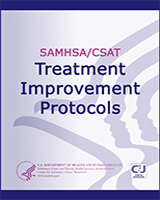Substance Abuse Treatment for Persons with Child Abuse and Neglect Issues
Treatment Improvement Protocol (TIP) Series, No. 36
Authors
Center for Substance Abuse Treatment.This TIP, Substance Abuse Treatment for Persons With Child Abuse and Neglect Issues, examines treatment issues for both adult survivors of child abuse or neglect and adults in treatment who may be abusing or neglecting their own children.
Chapters 1 through 3 focus primarily on adult survivors of child abuse and neglect. Chapter 1 defines child abuse and neglect, provides rates of child abuse and neglect both in the general population and among those in substance abuse treatment, and reviews the literature on links between childhood abuse and subsequent substance abuse. Chapter 2 describes screening and assessment tools that can be used to determine whether a client has a history of childhood abuse or neglect; Chapter 3 presents guidelines on treating clients with histories of child abuse or neglect and referring them to mental health care treatment when necessary. Chapter 4 discusses the personal issues counselors may encounter (e.g., countertransference) when working with clients with histories of abuse or neglect and offers suggestions for addressing them. In Chapters 5 and 6, the focus shifts to adults in treatment who may be abusing or neglecting their own children. Chapter 5 shows how alcohol and drug counselors can identify whether their clients are at risk of or are currently abusing or neglecting their children. It discusses what alcohol and drug counselors can do to break the cycle of child abuse and neglect, including how to work with child protective service agencies within the child welfare system. Chapter 6 is an overview of the legal issues that counselors should be aware of as mandated reporters. The TIP concludes with an overview in Chapter 7 of continuing and emerging trends, such as fast-track adoption and welfare reform, that counselors will need to follow in the coming years.
This publication is part of the Substance Abuse Prevention and Treatment Block Grant technical assistance program. This publication was written under contract number 270-95-0013 with The CDM Group, Inc. (CDM). Sandra Clunies, MS, ICADC, served as the CSAT government project officer. Rose M Urban, LCSW, JD, CCAS, served as the CDM TIPs project director. Other CDM TIPs personnel included Raquel Ingraham, MS, project manager; Jonathan Max Gilbert, MA, managing editor; Cara Smith, production editor; Kurt S Olsson, former editor/writer; Paul Seaman, former acting editor; Y-Lang Nguyen, former production editor; and MaryLou Leonard, former project manager. Special thanks go to consulting writers Tracy Simpson, PhD, and Christine Courtois, PhD, for their considerable contributions to this document.
The opinions expressed herein are the views of the Consensus Panel members and do not reflect the official position of CSAT, SAMHSA, or the U.S. Department of Health and Human Services (DHHS). No official support or endorsement of CSAT, SAMHSA, or DHHS for these opinions or for particular instruments or software that may be described in this document is intended or should be inferred. The guidelines proffered in this document should not be considered as substitutes for individualized client care and treatment decisions.
